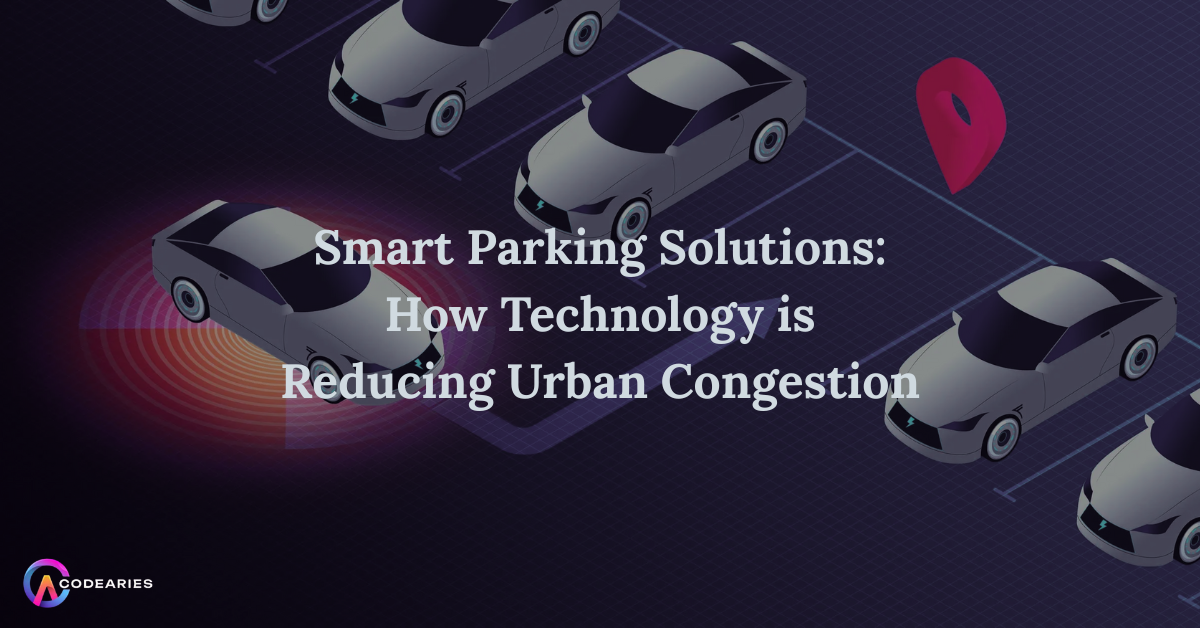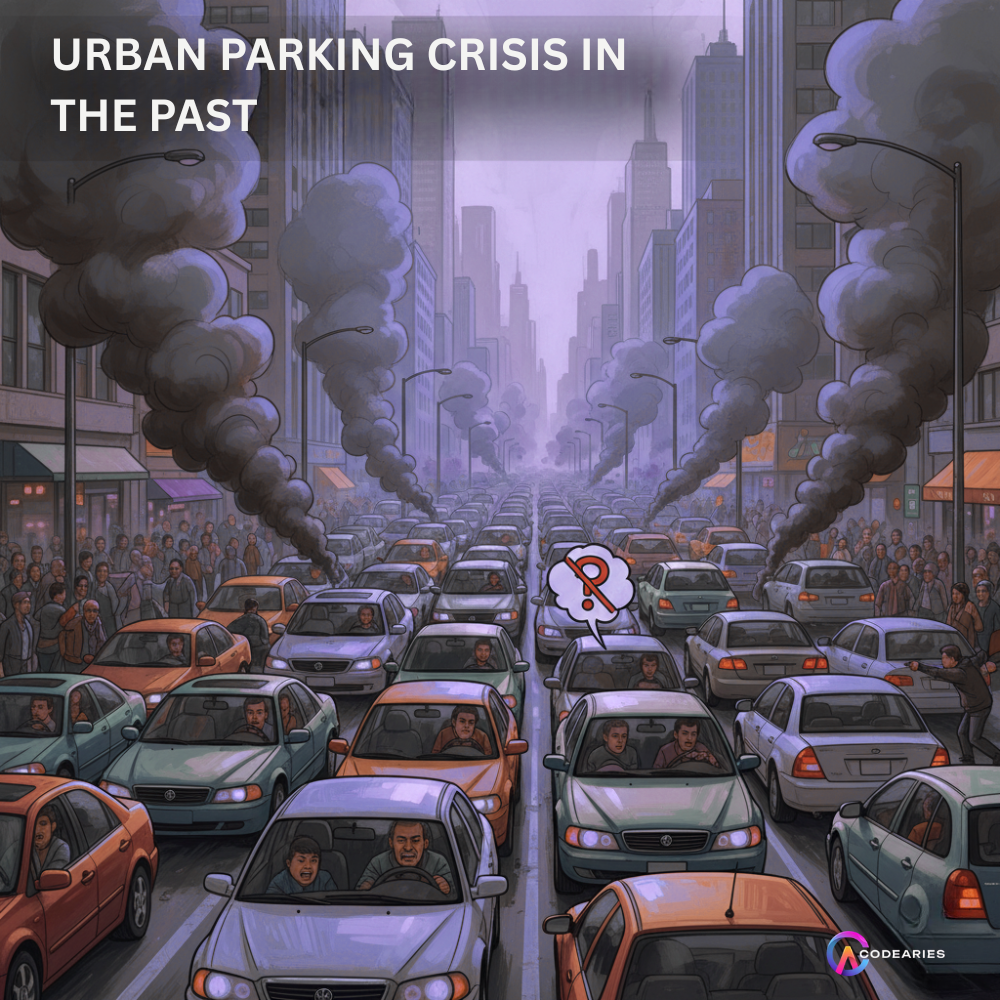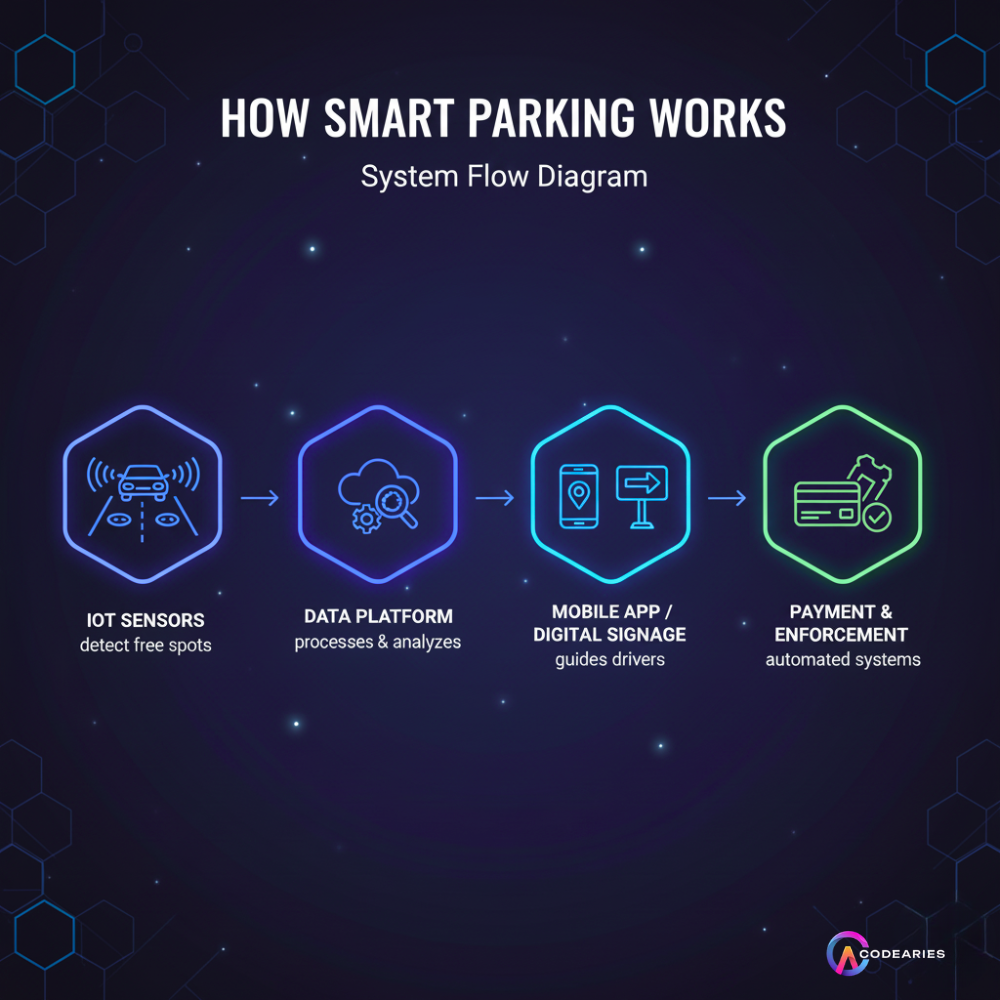
Urban congestion is a major challenge in modern cities. As populations grow and the number of vehicles increases, finding parking spaces has become very frustrating. It also contributes significantly to traffic jams and pollution. Recent studies show that a large percentage of urban traffic, sometimes up to 30%, is caused by vehicles circling in search of parking.
Smart parking solutions, using technologies like the Internet of Things (IoT), artificial intelligence (AI), and big data analytics, are changing how cities handle parking and reduce congestion. These technologies turn traditional parking systems into dynamic, data-driven networks. They improve the commuter experience, lessen environmental impacts, and increase revenue.
This blog looks at the development of smart parking technologies, their effects on urban congestion, the main features of modern solutions, and how Codearies helps cities and businesses create forward-thinking parking platforms.
Understanding the Urban Parking Crisis
Traditional urban parking suffers from several key pain points:
- Inefficiency: Drivers waste time looking for available spots, creating “cruising” traffic and increasing emissions.
- Poor Utilization: Fixed pricing and management leave spots unused or occupied by vehicles that overstay.
- Lack of Information: Without real-time data on availability, drivers guess and waste time.
- Manual Payments: Old payment systems slow transactions and frustrate users.
- Enforcement Challenges: Enforcing parking rules is hard, leading to violations and unfair use.
These problems not only affect daily commuters but also have wider social, economic, and environmental consequences.

What Are Smart Parking Solutions?
Smart parking systems use sensors, cameras, software, and connectivity to manage parking in real time. Key components include:
- Occupancy Sensors: These are installed in parking spots or entry points to detect availability.
- Data Analytics Platform: This combines sensor data to show live status and provide insights.
- User Interfaces: Mobile apps, web portals, and digital signs inform drivers about open spots and allow reservations.
- Payment Systems: These offer automated, contactless options with often flexible pricing models.
- Enforcement Technologies: These integrate cameras and monitoring to ensure rule compliance and prevent fraud.
These technologies make better use of existing infrastructure, increasing capacity without needing new lots.

How Smart Parking Reduces Urban Congestion
1. Real-Time Parking Availability
Apps give drivers immediate access to parking data, directing them to open spots and reducing unnecessary cruising. For example, sensor data linked to mobile maps directs users to nearby spots with efficient routes. Studies show up to a 43% reduction in parking search time and a 30% decrease in vehicle miles driven because of smart parking initiatives.
2. Dynamic Pricing and Demand Management
Pricing models adjust costs based on demand, time, or location. Higher prices encourage turnover during busy hours, while discounts promote off-peak parking. This helps keep spots open and discourages long-term misuse.
3. Enhanced Enforcement and Compliance
Smart cameras and analytics can spot overstaying vehicles, unauthorized parking, or misuse of reserved spots like disabled access or loading zones. Alerts allow quick action, improving space availability and fairness.
4. Integrated Multimodal Mobility
Smart parking solutions connect with public transport, bike-share, and ride-hailing apps to promote last-mile solutions. Parking hubs outside busy areas connect to greener, more efficient transport options.
5. Environmental Impact and Sustainability
Less cruising reduces fuel use and emissions, leading to better air quality. Cities can track environmental benefits through integrated analytics, supporting sustainability goals.
Key Features of Modern Smart Parking Systems
| Feature | Benefit or Function |
| IoT Sensors for Spot Monitoring | Real-time accurate occupancy data |
| Mobile Apps for Drivers | Easy spot finding, reservation, and payment |
| Dynamic Digital Signage | On-street indications to available spots |
| Automated Payment Systems | Contactless, frictionless transactions |
| Enforcement Integration | Automated violation detection and reporting |
| Data Analytics Dashboards | Insights for urban planners and operators |
| Multilingual and Accessibility | Inclusive user experience for diverse populations |
| Integration with Smart City Tech | Holistic urban traffic and mobility management |
The Future Outlook: Where Smart Parking is Heading
- AI-Enhanced Predictions: Advanced models predict demand based on events, weather, and historical data.
- Vehicle-to-Infrastructure (V2I) Communication: Cars will communicate with parking systems to reserve and pay automatically.
- Blockchain for Secure Transactions: Payment and enforcement records will be transparent and tamper-proof.
- Sustainability Metrics Embedded: Real-time CO2 savings reporting will help optimize environmental impact.
- Voice and AR Interfaces: Hands-free parking information and overlays will show available spots in real-world environments.
How Codearies Enables Smart Parking Innovation
At Codearies, we work with cities, developers, and businesses to create smart parking platforms that do more than ease congestion. They redefine urban mobility to be seamless, sustainable, and user-focused.
Our Core Solutions Include:
- Custom IoT Integration: Deploying and syncing sensors, cameras, and connectivity networks.
- Real-Time Analytics Platforms: Managing large data streams for live availability, predictions, and operational insights.
- Innovative Mobile & Web Apps: Creating user-friendly apps that direct drivers, allow bookings, and handle smart payments.
- Security and Privacy by Design: Ensuring strong data protection and compliance with regulations.
- AI & Machine Learning: Using advanced algorithms for demand forecasting, pricing, and automating enforcement.
- End-to-End Development & Support: From the initial idea through scaling and maintenance, we create future-ready systems tailored to each city’s needs.
Our team combines deep industry knowledge with cutting-edge technology to turn your smart parking vision into real-world results.
FAQs
How can smart parking reduce urban congestion?
Smart parking optimizes traffic by directing drivers straight to available spots, cutting down time spent cruising, and deterring parking violations through automated enforcement.
What technology powers modern smart parking?
Key technologies include IoT sensors, real-time analytics, mobile apps, AI-driven demand forecasting, and automated payment systems.
Can smart parking systems integrate with existing infrastructure?
Yes, Codearies specializes in seamless integration with city systems, old parking meters, and third-party traffic management tools.
How do you ensure user privacy with data sharing in smart parking?
We use anonymization, encryption, and comply with GDPR, CCPA, and other international standards to protect individuals’ privacy.
What are the steps to implement a smart parking solution?
Key steps include assessing needs, deploying hardware (sensors/cameras), developing software (apps/analytics), pilot testing, and rolling out city-wide with ongoing monitoring.


